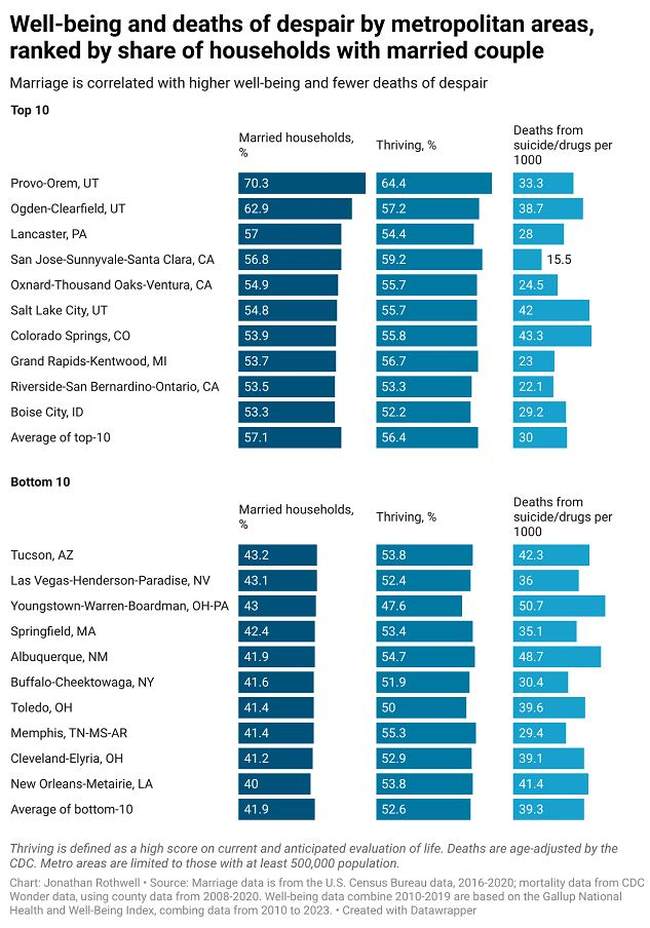Gallup reported on a new poll which says no matter how you slice it, married people report a higher sense of personal well-being than unmarried people.
Adults who are married report being far happier than those in any other relationship status, according to a Gallup Poll published Friday.
“Any way you analyze those data, we see a fairly large and notable advantage to being married in terms of how people evaluate their life,” said poll author Jonathan Rothwell, principal economist at Gallup.
Over a period of 15 years from 2009 to 2023, Gallup surveyed more than 2.5 million American adults. Included in those surveys was a self-assessment metric called the Cantril Scale:
The Cantril Self-Anchoring Scale, developed by pioneering social researcher Dr. Hadley Cantril, consists of the following:
- Please imagine a ladder with steps numbered from zero at the bottom to 10 at the top.
- The top of the ladder represents the best possible life for you and the bottom of the ladder represents the worst possible life for you.
- On which step of the ladder would you say you personally feel you stand at this time? (ladder-present)
- On which step do you think you will stand about five years from now? (ladder-future)
The results are then grouped into three basic groups: thriving, struggling and suffering. Thriving is people who report a 7+ for their current situation or an 8+ for their future expectations. Struggling means moderate views (5 or 6) of the present and moderate or negative views of the future. And lastly suffering means who rates their current or future situation as a 4 or below. Using this tool, Gallup found married people are significantly and consistently happier in every demographic.
Comparing across relationship status, adults who are married are by far the happiest, as measured by how they evaluate their current and future life. In 2023, married adults ages 25 to 50 are 17 percentage points more likely to be thriving than adults who never married, up from 12 percentage points in 2009. The gap favoring those who are married is consistently large over the entire 2009 to 2023 period, though it ranges from a low of 12 percentage points to a high of 24 percentage points.
The large gap in well-being favoring married people is not explained by simple demographic differences. The gap from 2020 to 2023 is 20 percentage points after adjusting for race, ethnicity, age, educational attainment, and gender. In fact, within each gender and race/ethnicity, married people report significantly higher well-being compared to those who never married. Both married men and married women see a 20-percentage-point advantage compared to their same-sex peers who never married (see Supplemental Table 1 in the Appendix).
There is a catch here which is worth mentioning. It's not possible to say based on the data if marriage causes the additional well-being seen in the results or if it just correlates with it. We can't say because it's possible that people who marry are essentially a self-selected group of people who were more likely to be happy anyway. I guess you could argue that it's not marriage causing happiness it's happiness causing marriage. Whatever the case, the size of the effect is pretty significant.
Educational attainment predicts well-being, but a married adult who did not attend high school evaluates life higher, on average, than an unmarried adult with a graduate degree, after adjusting for gender, race, and age. The Gallup data from 2020 to 2023 show that marital status is a stronger predictor of well-being for American adults than education, race, age, and gender (see Supplementary Table 1 in the Appendix).
Gallup found the people who expressed the biggest benefit were Republicans and those who were religious.
Republicans are significantly more likely to be thriving in their well-being compared to Democrats and Independents/third-party supporters, by 9 to 12 percentage points. Likewise, people with a religious preference are more likely to be thriving than atheists, agnostics, or those with no preference (by 6 percentage points). Yet, controlling for these things does not lower the effect of marriage, even though married people are more likely to be both Republicans and religious.
Finally, grouping cities by the percentage of people who are married and thriving, Gallup found a negative correlation with so-called deaths of despair ("suicide, drug or alcohol poisoning, or overdose"). The more married/thriving people in a given city the lower deaths of despair tended to be. Here's a chart from the study.
So it seems clear married people are happier either because marriage produces happiness or because happy people marry. Either way, it's a club adults should be looking to join.









Join the conversation as a VIP Member